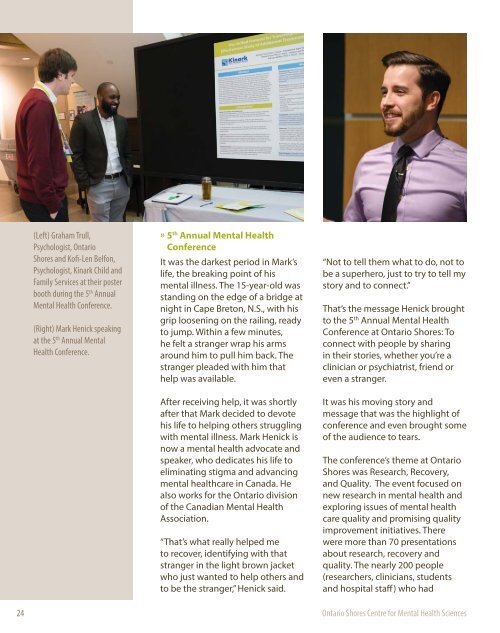Recovery and Hope 2015 - 2016 Annual Report
1UoTsnM
1UoTsnM
Create successful ePaper yourself
Turn your PDF publications into a flip-book with our unique Google optimized e-Paper software.
(Left) Graham Trull,<br />
Psychologist, Ontario<br />
Shores <strong>and</strong> Kofi-Len Belfon,<br />
Psychologist, Kinark Child <strong>and</strong><br />
Family Services at their poster<br />
booth during the 5 th <strong>Annual</strong><br />
Mental Health Conference.<br />
(Right) Mark Henick speaking<br />
at the 5 th <strong>Annual</strong> Mental<br />
Health Conference.<br />
» 5 th <strong>Annual</strong> Mental Health<br />
Conference<br />
It was the darkest period in Mark’s<br />
life, the breaking point of his<br />
mental illness. The 15-year-old was<br />
st<strong>and</strong>ing on the edge of a bridge at<br />
night in Cape Breton, N.S., with his<br />
grip loosening on the railing, ready<br />
to jump. Within a few minutes,<br />
he felt a stranger wrap his arms<br />
around him to pull him back. The<br />
stranger pleaded with him that<br />
help was available.<br />
After receiving help, it was shortly<br />
after that Mark decided to devote<br />
his life to helping others struggling<br />
with mental illness. Mark Henick is<br />
now a mental health advocate <strong>and</strong><br />
speaker, who dedicates his life to<br />
eliminating stigma <strong>and</strong> advancing<br />
mental healthcare in Canada. He<br />
also works for the Ontario division<br />
of the Canadian Mental Health<br />
Association.<br />
“That’s what really helped me<br />
to recover, identifying with that<br />
stranger in the light brown jacket<br />
who just wanted to help others <strong>and</strong><br />
to be the stranger,” Henick said.<br />
“Not to tell them what to do, not to<br />
be a superhero, just to try to tell my<br />
story <strong>and</strong> to connect.”<br />
That’s the message Henick brought<br />
to the 5 th <strong>Annual</strong> Mental Health<br />
Conference at Ontario Shores: To<br />
connect with people by sharing<br />
in their stories, whether you’re a<br />
clinician or psychiatrist, friend or<br />
even a stranger.<br />
It was his moving story <strong>and</strong><br />
message that was the highlight of<br />
conference <strong>and</strong> even brought some<br />
of the audience to tears.<br />
The conference’s theme at Ontario<br />
Shores was Research, <strong>Recovery</strong>,<br />
<strong>and</strong> Quality. The event focused on<br />
new research in mental health <strong>and</strong><br />
exploring issues of mental health<br />
care quality <strong>and</strong> promising quality<br />
improvement initiatives. There<br />
were more than 70 presentations<br />
about research, recovery <strong>and</strong><br />
quality. The nearly 200 people<br />
(researchers, clinicians, students<br />
<strong>and</strong> hospital staff) who had<br />
attended had the opportunity to<br />
hear from keynote speakers in the<br />
areas of education, research <strong>and</strong><br />
service delivery in mental health<br />
care.<br />
Mark Henick was one of the<br />
keynote speakers, who spoke<br />
about his lived experience<br />
with depression <strong>and</strong> anxiety<br />
(<strong>and</strong> suicide attempts) <strong>and</strong> the<br />
importance of connecting with<br />
individuals struggling with mental<br />
illness <strong>and</strong> having these kinds of<br />
“uncomfortable conversations.”<br />
“When we talk about quality in<br />
healthcare, sure we can talk about<br />
the metrics, we can talk about the<br />
diagnosis <strong>and</strong> the medicines <strong>and</strong><br />
the practices <strong>and</strong> the st<strong>and</strong>ards,”<br />
Henick said during his talk.<br />
“But what it comes down to is<br />
connecting with individual people,<br />
sharing into their stories, entering<br />
into their mess, safely of course,<br />
<strong>and</strong> helping them through their<br />
journey.”<br />
Henick also emphasized the<br />
importance of increasing the<br />
quality of healthcare among<br />
patients, clients, colleagues <strong>and</strong><br />
yourself. This begins by giving<br />
people the opportunity to have<br />
more conversations <strong>and</strong> sharing<br />
their stories in a safe environment.<br />
“People want to talk about these<br />
issues,” Henick said. “They want<br />
to talk about their personal<br />
experience with these kinds of<br />
issues. The problem is that nobody<br />
is asking. Nobody is setting up a<br />
safe space where they can have<br />
these conversations in a safe <strong>and</strong><br />
informed way.”<br />
Henick added that it’s important<br />
for mental health professionals to<br />
realize this too so they can better<br />
care for their patients, loved ones<br />
<strong>and</strong> themselves.<br />
“We can help people to fly, we can<br />
push people by connecting them<br />
by sharing in their stories <strong>and</strong> most<br />
importantly, by loving.”<br />
24 Ontario Shores Centre for Mental Health Sciences<br />
<strong>2015</strong> - <strong>2016</strong> <strong>Annual</strong> <strong>Report</strong> 25


